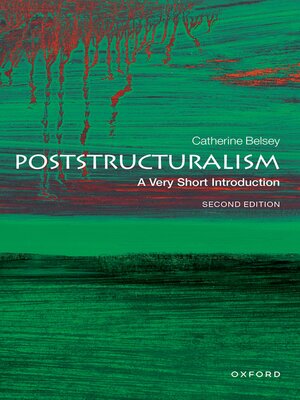
Sign up to save your library
With an OverDrive account, you can save your favorite libraries for at-a-glance information about availability. Find out more about OverDrive accounts.
Find this title in Libby, the library reading app by OverDrive.



Search for a digital library with this title
Title found at these libraries:
| Library Name | Distance |
|---|---|
| Loading... |
Very Short Introductions: Brilliant, Sharp, Inspiring Poststructuralism challenges traditional ways of thinking about human beings and our relation to the world. Language, meaning, and culture are all reappraised, and with them assumptions about what it's possible for us to know. More interested in posing sharply focused questions than in reassuring with certainties, its theorists tend to clarify the options, while leaving them open to debate. At once sceptical towards inherited authority and positive about future possibilities, poststructuralism asks above all that we reflect on its findings. In this Very Short Introduction, Catherine Belsey traces the key arguments that have led poststructuralists to challenge traditional theories of language and culture. In this new edition, such well-known figures as Barthes, Foucault, and Derrida are joined by less famous theorists, and examples are drawn from both high art and popular culture. Shakespeare features alongside advertising and Christmas cards, as well as Lewis Carroll, Marcel Duchamp, Toni Morrison, and the tantalizing lithographs of M. C. Escher. ABOUT THE SERIES: The Very Short Introductions series from Oxford University Press contains hundreds of titles in almost every subject area. These pocket-sized books are the perfect way to get ahead in a new subject quickly. Our expert authors combine facts, analysis, perspective, new ideas, and enthusiasm to make interesting and challenging topics highly readable.







